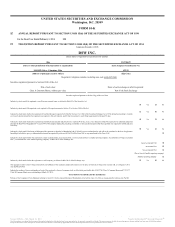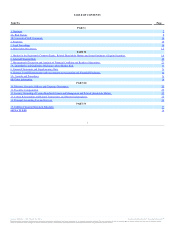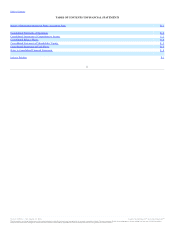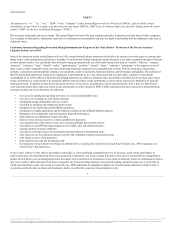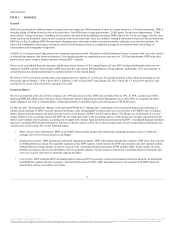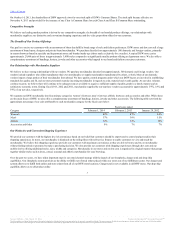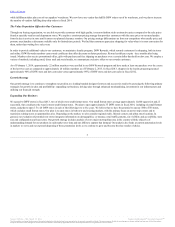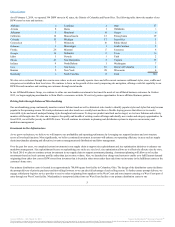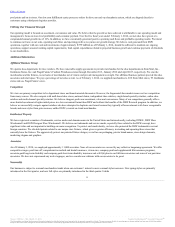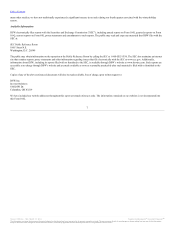DSW 2013 Annual Report Download - page 12
Download and view the complete annual report
Please find page 12 of the 2013 DSW annual report below. You can navigate through the pages in the report by either clicking on the pages listed below, or by using the keyword search tool below to find specific information within the annual report.
Table of Contents
In addition to the other information in this Annual Report on Form 10-K, shareholders or prospective investors should carefully consider the following risk
factors when evaluating DSW. If any of the events described below occurs, our business, financial condition and results of operations and future growth
prospects could be negatively affected.
We opened 30 DSW stores in fiscal 2013, plan to open approximately 35 DSW stores in fiscal 2014 and plan to open 15 to 20 DSW stores in each
of the following two to five years, which could strain our resources and have a material adverse effect on our business and financial
performance.
Our continued and future growth largely depends on our ability to successfully open and operate new DSW stores on a profitable basis as part of our real
estate strategy. During fiscal 2013, 2012 and 2011, we opened 30, 39 and 17 new DSW stores, respectively. Included in the 30 new DSW stores in fiscal 2013
were two small format stores. Our small format stores average approximately 12,000 square feet and, if successful, they could pave the way for more small
format stores. We plan to open approximately 35 stores in fiscal 2014, including six small format stores, and plan to open 15 to 20 stores each year for the
following two to five years. As of February 1, 2014, we have signed leases for an additional 30 stores opening in fiscal 2014 and 2015. During fiscal 2013, the
average investment in property and equipment, inventory and new store expenses required to open a typical new DSW store was approximately $1.7 million,
excluding construction and tenant allowances received from landlords.
This continued expansion could place increased demands on our financial, managerial, operational and administrative resources. We may not achieve our
planned expansion on a timely and profitable basis or achieve results in new locations similar to those achieved in existing locations in prior periods. Our
ability to open and operate new DSW stores on a timely and profitable basis depends on many factors, including, among others, our ability to: identify
suitable markets and sites for new store locations with financially stable co-tenants and landlords; negotiate favorable lease terms; build-out or refurbish sites
on a timely and effective basis; obtain sufficient levels of inventory to meet the needs of new stores; obtain sufficient financing and capital resources or
generate sufficient operating cash flows from operations to fund growth; open new stores at costs not significantly greater than those anticipated; successfully
open new DSW stores in markets in which we currently have few or no stores; control the costs of other capital investments associated with store openings;
hire, train and retain qualified managers and store personnel; and successfully integrate new stores into our existing infrastructure, operations, management
and distribution systems or adapt such infrastructure, operations and systems to accommodate our growth.
As a result, we may be unable to open new stores at the rates expected or at all. If we fail to successfully implement our growth strategy, the opening of new
DSW stores could be delayed or prevented, could cost more than anticipated and could divert resources from other areas of our business, any of which could
have a material adverse effect on our business.
To the extent that we open new DSW stores in our existing markets, we may experience reduced net sales in existing stores in those markets. As our store base
increases, our stores will become more concentrated in the markets we serve. As a result, the number of customers and financial performance of individual
stores may decline and the average sales per square foot at our stores may be reduced, which could have a material adverse effect on our business.
We are positioning DSW as an omni-channel retailer and expect to have significant capital investments and expenses related to our omni-channel
strategy. Failure to execute our omni-channel strategy could have a material adverse effect on our business, results of operations and how we
meet consumer expectations.
We have developed an omni-channel strategy and expect the omni-channel strategy implementation to take place over the next four years. This initiative will
require significant cost investment of cross-functional operations and management focus, along with investment in supporting technologies. We estimate it will
increase our operating expenses by $10 million in fiscal 2014. The omni-channel strategy is a business necessity to meet changing expectations of customer
experience and an opportunity to create a competitive advantage. It is a business necessity because the DSW customer expects to be able to shop seamlessly
across all sales channels. The omni-channel strategy can also create distance between DSW and single channel competitors as well as multi-channel
competitors who either do not operate in an omni-channel way or do not define omni-channel as broadly as DSW intends to define it.
The risk is that the execution of our omni-channel strategy could cost more than expected, have fewer benefits than anticipated, distract management from our
day-to-day operations, or be unsuccessful. In the event that our omni-channel strategy is unsuccessful, it may have a material adverse effect to our business,
results of operations or financial results.
8
Source: DSW Inc., 10-K, March 27, 2014 Powered by Morningstar® Document Research℠
The information contained herein may not be copied, adapted or distributed and is not warranted to be accurate, complete or timely. The user assumes all risks for any damages or losses arising from any use of this information,
except to the extent such damages or losses cannot be limited or excluded by applicable law. Past financial performance is no guarantee of future results.


